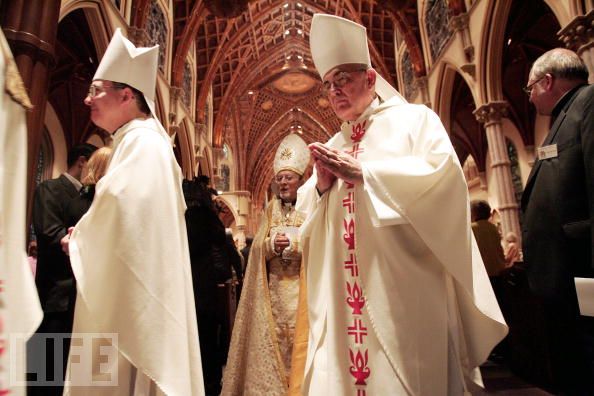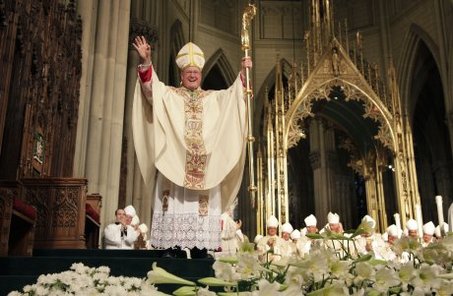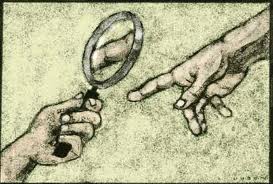COMMENTARY
New York Archbishop and United States Conference of Catholic Bishops (USCCB) president Timothy Dolan recently wrote to Barak Obama asking the president to sign the Defense of Marriage Act (DOMA): “We cannot be silent, however, when federal steps harmful to marriage, the laws defending it, and religious freedom continue apace.”
Can the marriages of some really “harm” those of others? Does Dolan not recognize how much support there is among active, practicing Roman Catholics for same-sex marriage? Does he really not know that scores of LGBT Catholics on the Communion lines at his own masses at St. Patrick’s Cathedral are married? That many work in Catholic ministry? That some are raising their children in the church? Dolan’s diocesan schools are filled with families in which there are only one or two children? Can he be naïve enough to imagine that this is accomplished through Natural Family Planning (NFP) alone? (NFP is the method of birth control the Vatican recommends and which its parishes often teach.)
Like much of the Roman Catholic hierarchy, Timothy Dolan is out of touch with who we American Catholics actually are.
He has every right not to remain silent, but the bishops’ presumption (fantasy?) that a majority of active U.S. Catholics will lend support to Vatican efforts to restrict the reproductive and marriage rights of non-Catholics is alarming — especially since so many active Catholics exercise those very freedoms. Furthermore, although the pope and his bishops may truly believe a zygote is a “preborn child,” the truth is that a great number of active Catholics do not, and they vote, in great numbers, accordingly.
There’s a reason the Vatican appointed the cigar-smoking, baseball-loving, borderline-charming Dolan to serve as shepherd of the Sodom and Gomorrah that is New York City. The passing of same-sex marriage rights legislation in his state and the reproductive health aspects of the new health care mandate present New York’s top priest with fresh opportunity to make his mark as the defender of the faith in the U.S. On Sept. 30, Timothy Dolan, in his capacity of USCCB president, announced the formation of a sub-committee whose task will be to respond to the “erosion of freedom of religion in America”: “…the new subcommittee would be one of several initiatives designed to strengthen the conference’s response and bring together a broad cross-section of churches and legal scholars to oppose attacks on the First Amendment.”
Dolan is fronting this crusade, and the degree of difficulty involved makes going out on a limb with a shaky “First Amendment” argument worth the gamble. He has appointed a Connecticut Bishop, William Lori, to head up the new committee. Unfortunately the first association many Catholics have with the “Diocese of Bridgeport” is its notorious status as a locus of sexual abuse. (In 2001, the Diocese of Bridgeport settled in 23 civil sex abuse cases, and there, according to Bishop Accountability.org, Timothy Dolan’s predecessor is alleged to have allowed priests facing multiple accusations to continue in ministry.)
 The USCCB is now lobbying hard to make same-sex civil marriage illegal in the U.S. and to deny (Catholic and not) employees in agencies run by the church medical coverage for contraception and sterilization. And they want Catholics in the pews to help. The bishops can count on the holy-father-knows-best Roman Catholic fringe to serve as hoplites in what the hierarchy-friendly Catholic News Service calls the “culture wars”. They’d follow the Borgia pope into hell. However, the bishops will lack critical Roman Catholic mass in these “culture wars,” and their strongest support for DOMA may come from “bring-your-gun-to-church” and “God hates fags” so-called “Christian” churches. Progressive Roman Catholics, who tend support LGBT marriage and view family planning as a moral responsibility and not a sin, are likely to think the First Amendment angle disingenuous and inane. Moderate Catholics, who might not long ago have had the USCCB’s back in a such controversies as DOMA or the health care mandate, are alienated and sickened by the pedophilia crisis. They can no longer be counted on to fall in line behind the bishops.
The USCCB is now lobbying hard to make same-sex civil marriage illegal in the U.S. and to deny (Catholic and not) employees in agencies run by the church medical coverage for contraception and sterilization. And they want Catholics in the pews to help. The bishops can count on the holy-father-knows-best Roman Catholic fringe to serve as hoplites in what the hierarchy-friendly Catholic News Service calls the “culture wars”. They’d follow the Borgia pope into hell. However, the bishops will lack critical Roman Catholic mass in these “culture wars,” and their strongest support for DOMA may come from “bring-your-gun-to-church” and “God hates fags” so-called “Christian” churches. Progressive Roman Catholics, who tend support LGBT marriage and view family planning as a moral responsibility and not a sin, are likely to think the First Amendment angle disingenuous and inane. Moderate Catholics, who might not long ago have had the USCCB’s back in a such controversies as DOMA or the health care mandate, are alienated and sickened by the pedophilia crisis. They can no longer be counted on to fall in line behind the bishops.
Were so much not at stake, I’d find Dolan’s recent foray into First Amendment advocacy amusing. Has he read the First Amendment? For he appears to miss the point. The First Amendment does not guarantee one religion the right to obtain religious liberty by stripping others of theirs.
“Congress shall make no law respecting an establishment of religion, or prohibiting the free exercise thereof…”
Many religions recognized and sanctified same-sex marriages long before same-sex marriage was legal in any state in the U.S. What (legal or moral) right has Timothy Dolan to tear lawful marriages asunder? Or to nullify covenants consecrated by Reform Jewish or Christian rites? Dolan’s campaign to (in effect) annul same-sex marriages reflects neither the spirit of ecumenism nor that of secular law as it pertains to marriage.
Same-sex couples in states in which equal-marriage legislation has passed are family now.
Furthermore, many atheists hold marriage equality (for lack of a better word, I say) “sacred.” Under the First Amendment, atheist LGBT and straight Americans enjoy the right not to be subject to religious law. DOMA wold impose religious law on everyone. This is an affront to all who take seriously the principle of separation between church and state. Though same-sex marriages are legal in the state of New York, no law compels Timothy Dolan to recognize them, and the First Amendment protects his right to refuse to marry LGBT Catholics in his church.
The consternation of the conflicted “believer” working at the marriage license bureau who finds processing marriage licenses for LGBT couples distasteful is nothing new. Many a court clerk during the Civil Rights Era no doubt endured a similar kind of anguish when required to process marriage licenses for heterosexual interracial couples. People allow moral discernment to shape their decisions about employment all the time. Marriage Bureau employees who find gay marriage distasteful must either suck it up or seek employment that better accommodates their prejudice.
Dolan is quoted in the National Catholic Register as having said the following: “If the label of “bigot” sticks to us — especially in court — because of our teaching on marriage, we’ll have church-state conflicts for years to come as a result.”
The archbishop is right to worry. The “label of bigot” will stick. The best way to defend against being called a bigot is to not be one.
Dolan is not nearly so interested in the First Amendment protections as he is in holding the Vatican’s doctrinal/political ground. The Roman Catholic hierarchy is under attack from within and without. Dolan is taking his shot. He’s hoping that cloaking bigotry the finery of constitutional protections might make him and his hierarchy appear more freedom-forward and perhaps a tad less medieval. But blurring, perforating, crossing and erasing the line of demarcation between church and state won’t win the archbishop any points with most American Catholics. And outside the church, Dolan’s First Amendment-based power play is likely to come off as the Captain Queeg-like snit of a “religious leader” who knows his ship is going down.
Dolan is playing the “good cop” role now, but “bad cops” surround him. On the matter of the health care mandate, Daniel N. DiNardo, chairman of the U.S. bishop’s pro-life committee was quick to whip out the shiv. He said this on Sept. 26, about a month after the USCCB announced its dissatsifaction with the terms of the the federal health care mandate:
“Under the new rule our institutions would be free to act in accord with Catholic teaching on life and procreation only if they were to stop hiring and serving non-Catholics. … Although this new rule gives the agency the discretion to authorize a ‘religious’ exemption, it is so narrow as to exclude most Catholic social service agencies and healthcare providers.”
The ultra hierarchy-friendly Catholic News Agency’s choice of the word “warned” says a lot. It’s code for “Give us what we want or we’ll stop healing, clothing, feeding, sheltering and offering hospice to non-Catholics.”
Another bishop, Bishop David A. Zubik of Pittsburg, weighed in with a similar kind of warning in a Sept. 15 letter to Human Health Services (HHS) secretary Kathleen Sibelius;
…Catholic Charities in his diocese alone has served over 80,000 people last year
”without regard to the religious belief” of those they ministered to.
But “under this [health care] mandate, Catholic Charities of Pittsburgh would either be forced to cease to exist or restrict its employees and its wide ranging social services to practicing Catholics alone.”
Essentially, Bishops Zubik and DiNardo are floating ultimata. They don’t come right out and say so, but the implication in Zubik’s case is that the bishops might have little choice but to add to the suffering and hardship of 80,000 people currently under the care of Catholic Charities. Not much Christ in that.
Thank God this vicious game of chicken won’t work. The public relations fallout would be disastrous if the bishops were to make good on such threats. Even the most conservative of Catholics would be ambivalent about such tactics because even daily-mass-attending, novena-praying rosary ladies who oppose abortion know that sacrificing sick, hungry, homeless “born” children to the supposed greater good of preserving the lives of zygotes and embryos would constitute a sin as grave as any.
That any bishop thinks it acceptable to use works of mercy as leverage is troubling and indicates just how estranged from Christian ideals many of the Catholic bishops are. From a public relations standpoint, the utter lack of diplomacy in such expressions as Zubik’s reveals how out of touch the Catholic hierarchy is with what the worlds sees when it beholds the church.
Much of the world now views the Roman Catholic Church as a corrupt organization led by a there-but-for-the grace-of-extradition-agreements-go-I pontiff. Were Ratzinger not head of a sovereign state, the world might well have witnessed his perp walk by now. The damning Cloyne Report turned the most pious Catholic nation in Europe against the hierarchy. The Vatican is on Amnesty International’s list of torturers for its human rights violations/crimes against children. The Center for Constitutional Rights and SNAP (Survivors Network of Persons Abused by Priests) are filing suit against the Vatican in the International Criminal Courts. Yet, even as it faces the possibility of a trial at the Hague, the Vatican continues to show poor faith in addressing the hundreds of thousands of brutal crimes against its own children.
Catholics in the pews are repulsed by this, and have grown weary of pro forma expressions of contrition for the anguish pedophile priests inflicted and which bishops facilitated. These apologies are never more tainted than when topped off with not-so-gentle reminders that justice (i.e. damages) for each and every victim would bankrupt the church.
The Vatican may be rich, but the church has money problems.
In the Brooklyn (N.Y.) diocese, where I worship, Bishop Nicholas DiMarzio has used his weekly column to urge Catholics in Brooklyn and Queens to vote against the Child Victim’s Act in the New York State Assembly. Payouts, we have been told, would bankrupt the diocese. DiMarzio has publicly threatened to close parishes whose members fail to vote his way. He recorded robocalls for a local politician. His politicking is, at least, risky behavior, and, at worst, possibly a violation of tax law. The aforementioned attempts at clerical blackmail, though unseemly, may be blessings in disguise, however, because they show the world who these “religious leaders” really are and where they stand on the church/state divide.
I take great pride in the work my church does on behalf of the aged, infirm, indigent and marginalized in the city where I live. My own experience working in social justice ministry has offered me opportunity to see closely how fervently devoted we (Catholics) are in it, yet I believe the world outside the church would indeed pick up the slack were the bishops to take their ball and go home.
Bishops play a dangerous game when they threaten to use the leverage they think they have to bring secular law in line with canon law. The church receives much financial support from the government in the form of tax exemptions. I don’t want to see my diocese or any other lose its tax exempt status, but the bishops are pushing their luck — which could soon run out, along with the money. The bishops would do well to bear in mind that they are called to be teachers and priests, not emperors. They play fast and loose with their tax-exempt status at their own peril and their recklessness in this puts needy people of all faiths — and no faith — at risk. Political power can be expensive. The religious freedom argument cuts both ways.
Full Article HERE!






